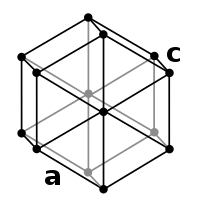
Photo from wikipedia
In this work, highly dispersed Ni nanoparticles confined in nanochannels of cerium-modified silica aerogels were in situ prepared originally via a simple sol–gel route. The obtained materials with good thermal… Click to show full abstract
In this work, highly dispersed Ni nanoparticles confined in nanochannels of cerium-modified silica aerogels were in situ prepared originally via a simple sol–gel route. The obtained materials with good thermal stability were used in the dry reforming of methane. The aerogel catalysts exhibited high catalytic activities and good catalytic stabilities towards the reaction. The improved catalytic activities were closely associated with the advantageous structural properties. The large specific surface area, high Ni dispersion and large pore volume could expose more active species to react with the gaseous reactants. In addition, the confinement effect of the mesopores contributed to the promotion of anti-sintering during the reduction and reaction processes, resulting in longer lifetime stabilities of aerogel catalysts. The addition of Ce played a significant role in suppressing carbon deposition by enhancing the reactive oxygen species on the catalyst surface. Generally, the developed catalysts could be considered as promising coking- and sintering-resistant catalysts for the dry reforming of methane.
Journal Title: New Journal of Chemistry
Year Published: 2017
Link to full text (if available)
Share on Social Media: Sign Up to like & get
recommendations!